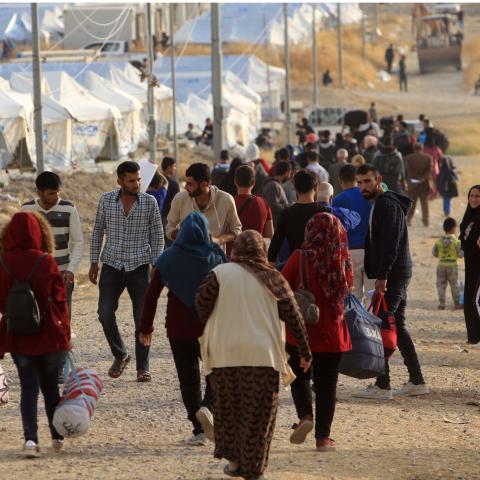
Alkarama condemns the forced deportation by the Lebanese authorities of dozens of Syrian refugees to areas controlled by the Syrian regime, despite the existence of the risk of torture -and extrajudicial executions- in violation of the principle of non-refoulement enshrined in the Convention against Torture.
Human rights sources reported that the Lebanese authorities have forcibly deported about 150 Syrian refugees to their country through the "Masnaa" crossing point since April 19, 2023.
The deportations took place under the pretext that the Syrians did not have residency documents in Lebanon while a plan to deport 15,000 Syrian refugees per month was unveiled.
"Even though they are registered with the UNHCR and are under the control of government forces, fears about the safety of refugees who are forcibly returned are compounded by the lack of news upon their return to Syria," said Alkarama's director, lawyer Rachid Mesli. "The arrests and deportations have been carried out in a very arbitrary manner, with security forces breaking into Syrian refugees' homes without warning, subjecting them to ill-treatment in several parts of the country," he said.
Article 3 of the Convention against Torture and Other Cruel, Inhuman or Degrading Treatment or Punishment, which Lebanon ratified in 2000, states that "no State Party shall expel, return ("refouler") or extradite a person to another State where there are substantial grounds for believing that he would be in danger of being subjected to torture".
Violation of the principle of non-refoulement
In May 2012, Alkarama informed the UN Special Rapporteur on Torture that of the seven Syrian nationals who had served their sentences in Lebanese prisons, three had already been deported to Syria upon completion of their sentences and that the others had been threatened with deportation.
In February 2011, Alkarama sent an urgent appeal to the Special Rapporteur on Torture regarding the risk of deportation of a Syrian national, Talaat Mustafa al-Kurdi, to his country, despite the possibility of his re-arrest and torture.
Alkarama also sent an urgent appeal concerning a Syrian national, Tariq Rajaa al-Nasser, and an Iraqi refugee, Alaa Saad al-Sayyad, who had already been forcibly deported to their respective countries despite the risk of arrest and torture.
In January 2021, Alkarama expressed its deep concern regarding the deportation of Russian citizen Victoria Matsakova by the Lebanese authorities, given the risk of torture in Russia, and in this context sent an urgent appeal to the Special Rapporteur on Torture and Other Cruel, Inhuman or Degrading Treatment or Punishment and the Special Rapporteur on the Promotion and Protection of Human Rights and Fundamental Freedoms while Countering Terrorism, asking them to intervene.
Alkarama's activism
Lebanon is one of the Arab countries where the use of torture is most widespread.
In May 2022, the UN Subcommittee on Prevention of Torture expressed concern about prolonged detention, overcrowding and deplorable living conditions in detention facilities during its second visit to Lebanon.
The head of the Subcommittee's mission in Lebanon, Nika Kvaratskhilia, said in a press release that "12 years have passed since our first visit to Lebanon, most of the recommendations from that visit have not yet been implemented and the Government's efforts have not had a significant impact on the situation of people deprived of their liberty".
The UN Committee's positions are similar to those expressed in the reports that Alkarama has submitted to the UN in recent years.
In this regard, in May 2017, Lebanon was subject to its first review by the UN Committee against Torture.
On 30 November, the UN Committee issued its concluding observations, granting the country's authorities a one-year deadline for the implementation of four priority recommendations, namely the revision of the definition of torture and its criminalization, the respect of fundamental legal safeguards for detainees, the establishment of a national human rights institution, and the establishment of an independent national preventive mechanism to receive complaints of torture.
The Committee invited the state party and nongovernmental organizations to monitor the implementation of these recommendations and to provide data on them within one year.
On 6 June 2018, the authorities submitted a follow-up report containing information relating to the implementation of the four recommendations. In its report dated 4 September 2018, Alkarama stressed that the measures taken by the government were insufficient and that more efforts were needed to definitively eradicate torture.
In the framework of Lebanon's third periodic review before the Human Rights Committee, Alkarama submitted another alternative report dated 12 February 2018 in which it assessed the situation of civil and political rights in the country. In the report the focus was on the persistence of the practice of torture, the violation of the right to a fair trial, the restriction of the right to privacy and freedom of expression as well as the urgent need for the State to activate its national human rights institution.
In July 2020, Alkarama submitted an alternative report in the framework of the Universal Periodic Review to the UN Human Rights Council, which mentioned various cases of torture and made recommendations to the State.
It should be noted that torture in Lebanon is a common practice. For example, all those arrested in connection with the events in Nahr al-Bared were subjected to torture and/or ill-treatment, including those who were detained for short periods.
